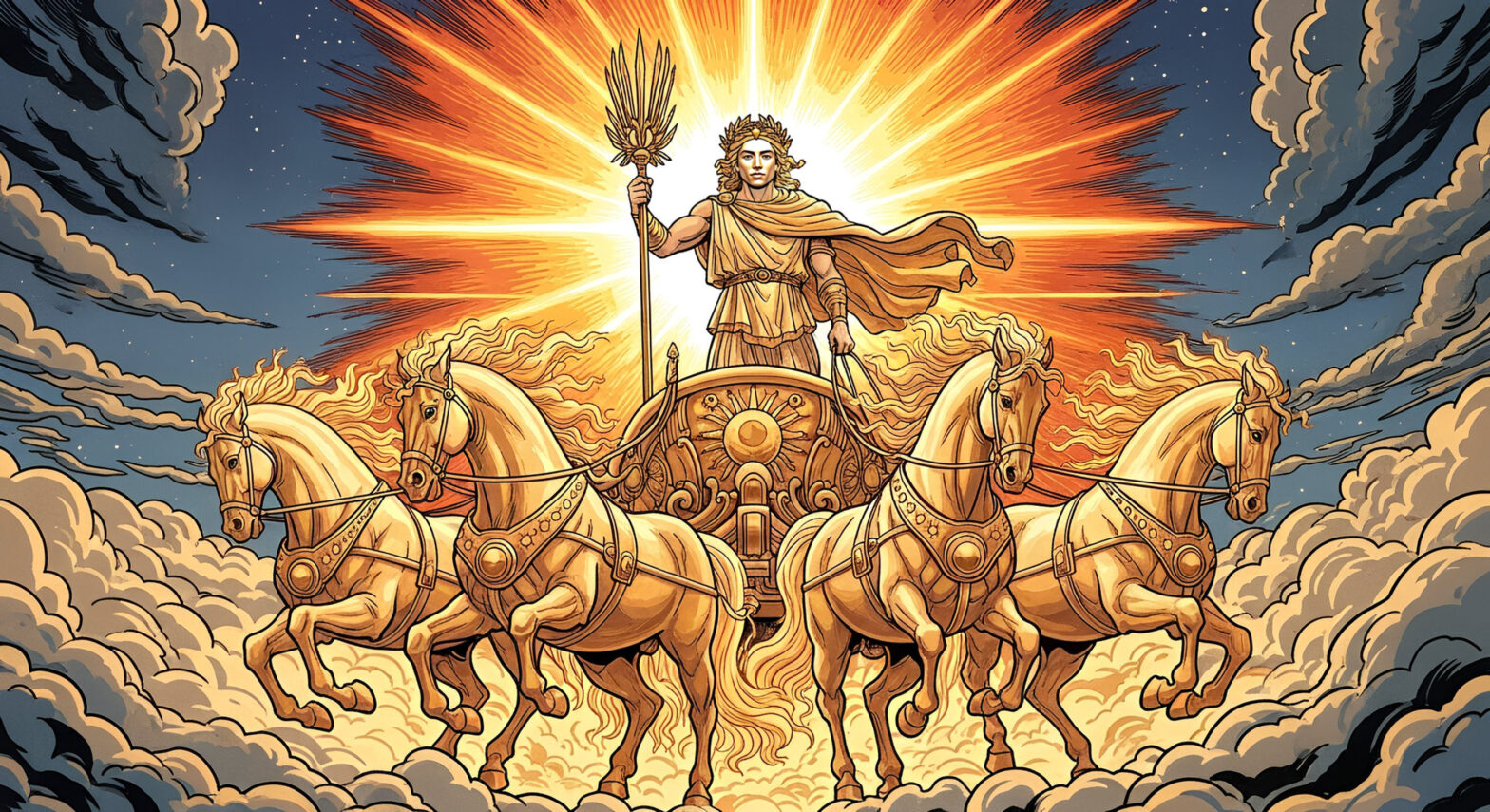The Sun is the most glorious and radiant of all the planets. Philosophers call him Oculus Mundi—the Eye of the World—and Fons Lucis—the Fountain of Light. From the Hebrew Shemesh comes his name; for when he rises upon any horizon, his rays scatter the dimmer lights of Moon and stars and make them disappear. The Greeks name him Hēlios, signifying his sufficiency to appear and to rule alone. He is truly Rex Planetarum, the King of the Planets: for while the other six at times retrograde, stand still, or wander to either side of the ecliptic, this princely body never departs from it, but keeps the ecliptic as his proper mansion and is always found there.
He is masculine and diurnal—by his presence he makes day, by his absence night. His nature is hot and dry, yet astrologers judge him more temperate than Venus. He completes his circuit of the twelve signs in twelve months—one month to each sign. By his motion we measure days, months, and years; he is Calamus Mensurans, time’s true measuring reed.
The Sun signifies a person large and full in body, with a broad, high head and a great, well-fleshed face; a complexion like saffron or honey; prominent eyes and a piercing sight; hair yellow or bright flaxen, with a full beard. He denotes a great spirit—honest, sincere, humane, courteous—and of a healthy constitution, bountiful and well disposed.
When the Sun is well dignified, the native desires rule and sovereignty, yet is prudent and of incomparable judgment. He keeps his promises, is lofty in aim, and labors earnestly for honor and reputation. He shows himself courteous and affable to all, is grave, faithful, and secret, and utterly detests all that is sordid or base.
If ill dignified, the native becomes proud, domineering, restless, and troublesome—lacking gravity in speech and sobriety in action; a mere vapor, boasting of lineage; a spendthrift or hanger-on of other men’s charity.
Persons signified by the Sun are emperors, kings, princes, dukes, marquesses, earls, barons, magistrates of every kind, gentlemen, and courtiers in general. Of trades and professions he rules goldsmiths, money-minters, coppersmiths, braziers, and pewterers.
Herbs and Plants of the Sun
Angelica; ash tree; balm; one-blade; burnet; butterbur; chamomile; celandine; centaury; eyebright; St. John’s-wort; lovage; marigold; rue; saffron; tormentil; turnsole (heliotrope); viper’s bugloss; willow; and the nut tree.
These plants are noted for the astrological physician, who—judging the cause of disease from the nativity—may know which remedies best accord with the Sun’s virtue.
The Sun in the Houses of Other Planets
In the Houses of Saturn (Capricorn or Aquarius)
If the Sun is Lord of the Nativity and placed in Capricorn or Aquarius in a diurnal birth, the native is of good quality—benevolent, cheerful, pleasant in conversation, and soberly delightful, able to make others merry. He will be skilled at many crafts, if he chooses to practice them. In a nocturnal birth, he becomes unstable in what he begins and quick to change his purpose.
In the Houses of Jupiter (Sagittarius or Pisces)
In a day nativity with the Sun in Sagittarius or Pisces, the native surpasses his neighbors, is famed among men, and gladly resides with nobles and great persons. Yet he is given to lewdness and will be reputed a fornicator—committing adultery with neighbors’ wives and even sinning with his mother-in-law.
In the Houses of Mars (Aries or Scorpio)
With the Sun in Aries, fortunate and strong in a diurnal birth, the native is highly esteemed—especially among kings and great men—and will willingly follow war continually, unless the lord of the triplicity of the Ascending sign opposes, which cannot wholly prevent but may much diminish these promises. In a nocturnal birth, only a third part of this testimony will come to pass.
If, in a day nativity, the Sun is in Scorpio, the native is unfortunate unless the said triplicity lords befriend him; whatever his fortune, he will suffer an ill habit of body with sickness. Alboaly says his father will die an evil death. In a night nativity, the same holds according to the strength or weakness of the triplicity lords.
In His Own House (Leo)
If the Sun is in Leo, fortunate on an angle—especially the tenth—or on a succedent (with chief strength from the tenth), it signifies a mighty and exalted king. If of royal stock, he is fit for great offices and high dignities; if of middling lineage, he attains notable honor, great wealth, and reputation; if of humble birth, he still rises to remarkable offices and dignities, though he will fear great mischiefs may befall him through them. Alboaly adds: in nocturnal nativities it denotes the father’s weakness and sudden death, and that the native will gain much by travel.
In the Houses of Venus (Taurus or Libra)
With the Sun in Taurus or Libra, by day or by night, the native is sincere and just, an interpreter of dreams, and one who can discover hidden and secret matters—yet he will offend by falling into uncleanness.
In the Houses of Mercury (Gemini or Virgo)
If, in a day nativity, the Sun is in Gemini or Virgo, the native is well skilled in the sciences and more expert than his contemporaries, being also of good behavior. Alboaly says he may be an astronomer, known to and beloved by kings and nobles. In a night nativity, he is unfortunate and needy and willingly commits evil. Albonly further notes: poor in youth, he grows rich in middle age; he suffers disease of the secret parts; he acts as an exorcist, undoing the works of devils and wicked men.
From The Doctrine of Nativities, JOHN GADBURY
